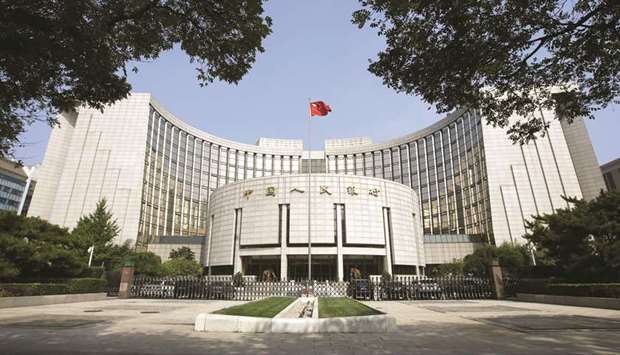China’s central bank provided medium-term funding to commercial lenders and cut the interest rate it charges for the money, a move widely anticipated by analysts to cushion the economy from the virus epidemic.
The People’s Bank of China offered 200bn yuan ($29bn) of one-year medium-term loans yesterday.
The rate was lowered by 10 basis points to 3.15%, the lowest since 2017.
The central bank also added 100bn yuan of funds via 7-day reverse repurchase agreements, resulting in a net 700bn yuan withdrawal of money from markets as some 1tn yuan of reverse repos matured yesterday.
The rate reduction is “in line with expectations, while the injection amount is relatively small as interbank funding is sufficient after the new year,” said Zhou Guannan, an analyst at Huachuang Securities Co in Beijing.
Zhou expects additional MLF funding to be supplied in March.
Since the outbreak of the coronavirus worsened in late January, China’s central bank and government have announced small rate cuts, early bond sales, and various other targeted measures to calm financial markets and support companies.
So far, there’s not been a massive increase in stimulus, although that may change if and when the coronavirus is brought under control.
Yesterday’s rate cut is likely to be matched by a similar reduction in the loan prime rate, which is the basis for pricing corporate and household loans.
A Bloomberg survey showed economists expect the rate for 1-year loans to fall by 10 basis points when it’s announced on February 20.
Futures on China’s 10-year government bonds reversed gains after the operation, falling 0.27% as of 3:11pm in Shanghai.
The yield on sovereign notes due in a decade rose 3 basis point to 2.896%.
“The injection is relatively small,” said Becky Liu, head of China macro strategy at Standard Chartered Plc, adding the operation will reduce incentives to chase Chinese government and policy bank bonds. “It means the PBoC does not intend to further lower front-end rates from here.”
“I don’t think investors are overly worried about a lack of liquidity as it’s a clear trend that the PBoC would ease,” said Zhou Hao, an economist at Commerzbank AG. “Any declines in bonds resulted from today’s operation will create an opportunity for investors to buy more debt.
The 10-year sovereign yield may fall to 2.8% in the coming weeks.”

The People’s Bank of China headquarters in Beijing. The PBoC offered 200bn yuan ($29bn) of one-year medium-term loans to commercial lenders yesterday. The rate was lowered by 10 basis points to 3.15%, the lowest since 2017.
